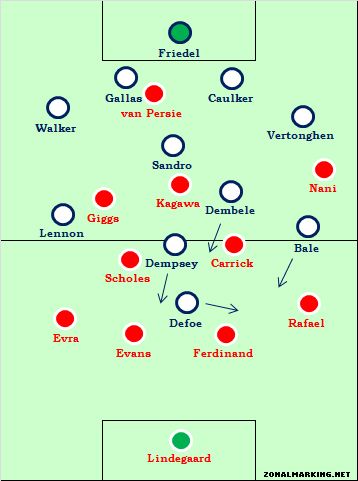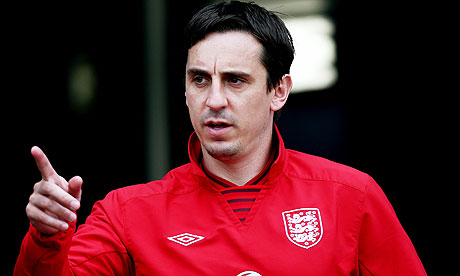Why Gary Neville is out on his own when it comes to TV punditry
England's assistant coach saved Roy Hodgson a job later this week when he marked Rio Ferdinand's card for him on Monday
England's assistant coach Gary Neville seems to have taken to TV punditry like few former players before him. Photograph: Lee Smith/Action Images
Presumably now those people who threatened to cancel their subscriptions when
Gary Neville was appointed as
Sky Sports's main pundit have come to realise, whether they like to admit it or not, that if they can just detach themselves from the endless slog of club allegiances for a few moments and listen, without prejudice, there is a good chance they might actually learn something.
His analysis of Arsenal's defending, for example, for Chelsea's winning goal on Saturday, and the clear evidence that Arsène Wenger still lacks an authority figure in the heart of his defence, all of which goes against the swell of opinion after Arsenal began the season with three clean sheets and a heap of praise for Steve Bould, their former centre-back now operating as assistant manager.
Neville explained his points calmly and succinctly, highlighted the way Arsenal's defenders had been four or five yards inside their own penalty area as they prepared to face a free-kick, why it was inviting trouble and the fact there was nobody getting everyone organised in the way, as he then showed, John Terry could later be seen doing for Chelsea.
He talked about it being a question of leadership, of someone needing to take the initiative, get on the edge of the area, spread their arms and make it clear that nobody was going beyond that point. He remembered what it used to be like during the days of Tony Adams and, by the end of it, you just hoped for Arsenal's sake that their players were watching it, too.
But it was Neville's response when it came to the
Rio Ferdinand question that really stood out during Sky's Monday Night Football, given this was probably the first time that the lines between his television work and his position as
Roy Hodgson's assistant with the
England team blurred into one.
Ed Chamberlin, the host, wanted to know if Ferdinand had an international future now that Terry was no longer on the scene. Add in the fact that Neville spent nine years as a colleague of Ferdinand's at
Manchester United and knows very well how much his former team-mate cherished playing for England and it was a difficult question, to put it mildly.
What followed felt like the unofficial confirmation Ferdinand will continue to be left out when Hodgson names his squad on Thursday for England's next two World Cup qualifiers, against San Marino and Poland.
"He is a class defender, but [at] the World Cup, he'll be 35," Neville said. "Roy Hodgson has said importantly — and it's a mistake many managers have made with England — he's not going to take 34-year-olds, 35-year-olds who are seasoned internationals, who have 70-odd, 80 caps, to sit in the stand. I've seen that be divisive in previous squads and it will be divisive in this squad. And it won't happen, and it's the correct decision.
"The door is not closed on Rio Ferdinand, but he won't be sat in the stand. If he gets selected by Roy Hodgson, he'll be the first name on the team-sheet. But this is not a player who's been playing for England for the last 20 months consistently. This is not just a Roy Hodgson thing.
"People are getting fixated with this. This happened when Paul Gascoigne was coming to the end of his England career. This happened when David Beckham was coming to the end of his England career. Roy Hodgson has never said that Rio Ferdinand will not play for England. Rio Ferdinand has never said that he's not going to play for England.
"But how many games do you think Rio Ferdinand played for Fabio Capello in the last 18 months? Three. How many games do you think he played competitively? His last competitive game under Fabio Capello was 12 months before Roy Hodgson took charge. He played only three of Fabio Capello's last 18 games. He's not been playing for England for the last two years. Roy Hodgson is looking towards 2014."
Neville had made his point eloquently and diplomatically and, in doing so, he has probably helped Hodgson to avoid a number of awkward questions on Thursday, when the manager holds his first press conference since Terry's international retirement.
Ferdinand, after all, believes he is being kept out for political reasons because of the broken state of his relationship with Terry, acquitted in court of racially abusing Anton Ferdinand, Rio's younger brother, but found guilty by an FA independent commission and suspended for four matches, pending a possible appeal.
That suspension leaves a space for another centre-half and,
as I wrote on Sunday, it is certainly a strange set of circumstances that someone can be good enough to play for Manchester United, the most successful team in the country, but find himself, almost certainly, behind talented yet raw players such as Martin Kelly and Steven Caulker.
What a fuss that caused. Ferdinand had just been part of a United defence badly exposed by Tottenham in a 3-2 defeat at Old Trafford. He had been poor, of that there is no question, but the point was that it was not fair judging him on one bad performance when Sir Alex Ferguson, who knows a thing or two whether you like him or not, still trusts him to be part of his defence — ahead of, for example, Phil Jones and Chris Smalling, both of whom are firmly in Hodgson's plans.
Neville certainly had a very different interpretation about what actually happened on Saturday to the popular one.
"People will say Rio Ferdinand's lost the pace, a yard of pace," he said. "Maybe he has. But I think he'd have struggled in that position five or six years ago, I really do.
"He's the one who's going to take the hit, because he's that's involved. He's the one who's chasing [Jan] Vertonghen. He's the one chasing [Gareth] Bale. He's the one who's taken the hit. But there are four or five mistakes on each of those goals.
"Rio Ferdinand is a great centre-back. He's a quick centre back. Still quick. Still quicker than Steve Bruce. He's still quicker than Tony Adams. He's still quicker than John Terry … but how many times do you see those players isolated one on one?"
This is when Neville turned to the performances of Rafael Da Silva and Patrice Evra, barely able to conceal his displeasure at the way the two full-backs had exposed United's centre-halves. "You [full-backs] can go forward, but you've got to get back in quickly. You've got to get back in quickly. You've got to understand the pace of the players you're playing against. [Aaron] Lennon and Bale will run past most players, at any point in their prime. You've got to tuck in alongside. Attach the two full-backs to your centre-backs.
"Rio's taken a lot of stick because he was involved in all three goals [against Tottenham], to the visible eye," Neville said. "Honestly, to play centre-back on Saturday would have been tough. They didn't play well, Rio and Jonny [Evans]. There were times they were too deep. The movement from Tottenham was fantastic, they were up against quick players …but your back four has got to get in place. That was the problem on Saturday with the three goals — the gaps were huge."
There are still a few questions unanswered. The age thing is curious when Hodgson said, only three weeks ago, that he was perfectly relaxed about taking 30-somethings to the World Cup. "I will not write anyone off on grounds of age." Frank Lampard, for example, is five months older than Ferdinand, playing in a position that requires far more energy and distance covered per match. Steven Gerrard will be 34 before the next World Cup and, like Ferdinand, has suffered from recurrent injury issues in the past.
Ferdinand tends to be written off, first and foremost, as injury-prone but Neville did not cite that once, and with good reason. The fact is only one other player, Wayne Rooney, made more starts for United in the league last season. Apart from the first week of the season, Ferdinand had not missed a league match through injury since January.
The difference, perhaps, is that Hodgson sees Gerrard and Lampard as starters in 2014 whereas Ferdinand would not be and, after that, it comes down to a question of whether it would be, to use Neville's word, "divisive" to have a player of his achievement among the substitutes.
The official reason appears to be that Hodgson thinks it would be wrong to include Ferdinand unless he were going to start the matches. Whether there is an unofficial reason, Ferdinand will probably never find out. One certainty, however, is that it is a shame there are not more pundits around with Neville's ability to make relevant points, inform and educate – with or without his England hat on.


